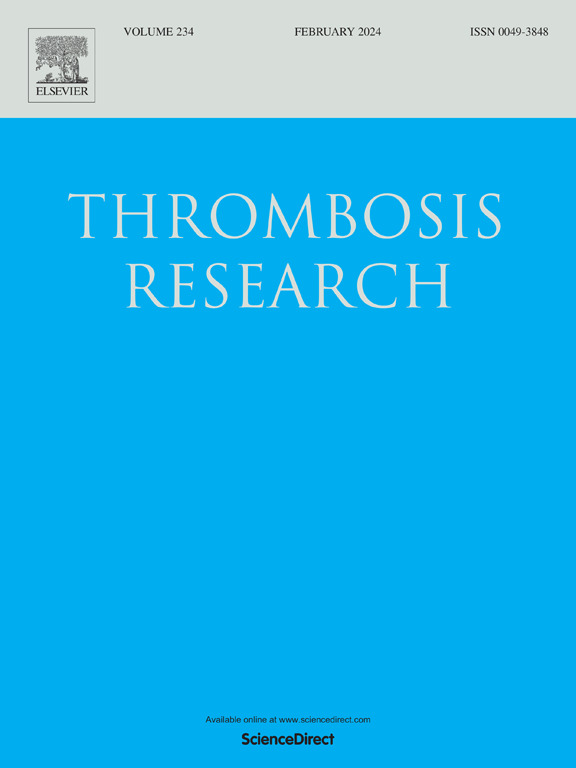直接口服抗凝剂治疗房颤合并痴呆患者的有效性和安全性比较
IF 3.7
3区 医学
Q1 HEMATOLOGY
引用次数: 0
摘要
心房颤动(AF)和痴呆患者在卒中预防方面面临着独特的挑战,特别是在选择合适的抗凝治疗方面。直接口服抗凝剂(DOACs)可有效降低卒中和栓塞风险,但在这一人群中比较其有效性和安全性的证据仍然有限。我们使用倾向评分匹配来平衡六个DOAC比较对的基线特征。结果与阿哌沙班相比,达比加群表现出优越的预后,降低了缺血性卒中、急性心肌梗死、颅内出血、大出血和全因死亡率的综合风险(风险比[HR], 0.82;95%可信区间[CI], 0.73-0.92),依多沙班(HR, 0.81;95% CI, 0.71-0.92)和利伐沙班(HR, 0.82;95% ci, 0.73-0.91)。它还显示颅内出血和全因死亡率的风险较低。排除鼻胃管或严重肾损害患者的敏感性分析显示,总体结果差异较小,但维持达比加群在降低颅内出血风险方面的优势。该研究表明,在这一弱势人群中,需要定制抗凝策略,达比加群可能是预防AF合并痴呆患者卒中的更安全、更有效的选择。未来的研究应该检查不同临床环境下DOAC的个体效应,以优化治疗结果。本文章由计算机程序翻译,如有差异,请以英文原文为准。
Comparative effectiveness and safety of direct oral anticoagulants in atrial fibrillation patients with dementia
Introduction
Patients with atrial fibrillation (AF) and dementia face unique challenges in stroke prevention, particularly in selecting appropriate anticoagulation therapy. Direct oral anticoagulants (DOACs) effectively reduce stroke and embolism risks, but evidence comparing their effectiveness and safety in this population remains limited.
Methods
This retrospective, population-based cohort study used data from Taiwan’s National Health Insurance Research Database to evaluate outcomes of four DOACs (dabigatran, apixaban, edoxaban, and rivaroxaban) in AF patients with dementia aged 50 years or older. We used propensity score matching to balance baseline characteristics across six DOAC comparison pairs.
Results
Dabigatran demonstrated superior outcomes, reducing the composite risk of ischemic stroke, acute myocardial infarction, intracranial hemorrhage, major bleeding, and all-cause mortality compared to apixaban (hazard ratio [HR], 0.82; 95 % confidence interval [CI], 0.73–0.92), edoxaban (HR, 0.81; 95 % CI, 0.71–0.92), and rivaroxaban (HR, 0.82; 95 % CI, 0.73–0.91). It also showed lower risks of intracranial hemorrhage and all-cause mortality. Sensitivity analyses excluding patients with nasogastric tubes or severe renal impairment showed smaller differences in overall outcomes but maintained dabigatran's advantage in reducing intracranial hemorrhage risk.
Conclusions
This study demonstrates the need for tailored anticoagulation strategies in this vulnerable population, with dabigatran emerging as a potentially safer and more effective option for stroke prevention in AF patients with dementia. Future research should examine individual DOAC effects across diverse clinical settings to optimize treatment outcomes.
求助全文
通过发布文献求助,成功后即可免费获取论文全文。
去求助
来源期刊

Thrombosis research
医学-外周血管病
CiteScore
14.60
自引率
4.00%
发文量
364
审稿时长
31 days
期刊介绍:
Thrombosis Research is an international journal dedicated to the swift dissemination of new information on thrombosis, hemostasis, and vascular biology, aimed at advancing both science and clinical care. The journal publishes peer-reviewed original research, reviews, editorials, opinions, and critiques, covering both basic and clinical studies. Priority is given to research that promises novel approaches in the diagnosis, therapy, prognosis, and prevention of thrombotic and hemorrhagic diseases.
 求助内容:
求助内容: 应助结果提醒方式:
应助结果提醒方式:


